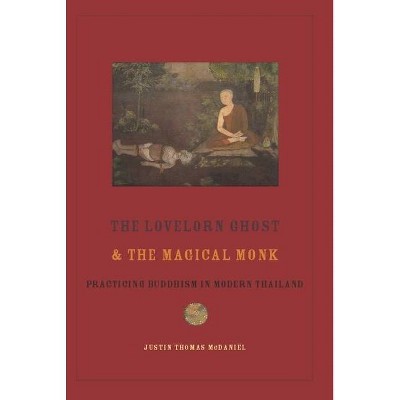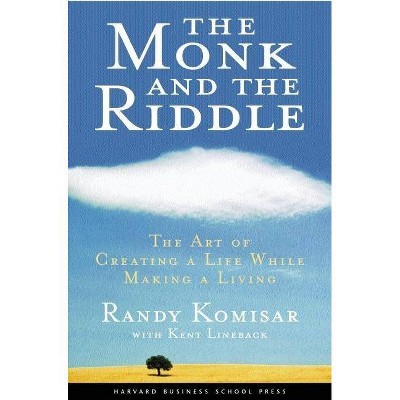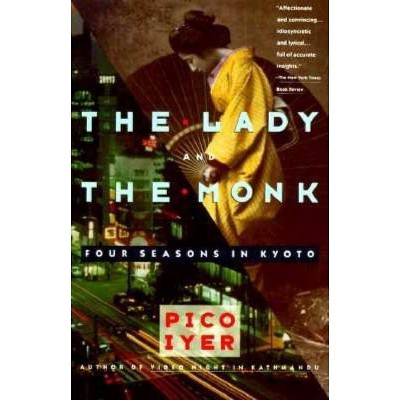The Lovelorn Ghost and the Magical Monk - by Justin McDaniel (Paperback)

Similar Products
Products of same category from the store
AllProduct info
<p/><br></br><p><b> About the Book </b></p></br></br><p>Focusing on representations of a famous ghost and monk from the late eighteenth century to today, Justin Thomas McDaniel builds a case for interpreting modern Thai Buddhist practice through the movements of these transformative figures. He follows embodiments of the ghost and monk in a variety of genres and media, including biography, drama, ritual, art, liturgy, film, television, and the Internet. Sourcing nuns, monks, laypeople, and royalty, McDaniel shows how relations with these figures have been instrumental in crafting histories and modernities, particularly local conceptions of being "Buddhist," and the formation and transmission of such identities across different venues and technologies.</p><p/><br></br><p><b> Book Synopsis </b></p></br></br>Stories centering on the lovelorn ghost (Mae Nak) and the magical monk (Somdet To) are central to Thai Buddhism. Historically important and emotionally resonant, these characters appeal to every class of follower. Metaphorically and rhetorically powerful, they invite constant reimagining across time. <p/>Focusing on representations of the ghost and monk from the late eighteenth century to the present, Justin Thomas McDaniel builds a case for interpreting modern Thai Buddhist practice through the movements of these transformative figures. He follows embodiments of the ghost and monk in a variety of genres and media, including biography, film, television, drama, ritual, art, liturgy, and the Internet. Sourcing nuns, monks, laypeople, and royalty, he shows how relations with these figures have been instrumental in crafting histories and modernities. McDaniel is especially interested in local conceptions of being "Buddhist" and the formation and transmission of such identities across different venues and technologies. <p/>Establishing an individual's "religious repertoire" as a valid category of study, McDaniel explores the performance of Buddhist thought and ritual through practices of magic, prognostication, image production, sacred protection, and deity and ghost worship, and clarifies the meaning of multiple cultural configurations. Listening to popular Thai Buddhist ghost stories, visiting crowded shrines and temples, he finds concepts of attachment, love, wealth, beauty, entertainment, graciousness, security, and nationalism all spring from engagement with the ghost and the monk and are as vital to the making of Thai Buddhism as venerating the Buddha himself.<p/><br></br><p><b> Review Quotes </b></p></br></br><br>...this monograph will likely serve for years to come as a benchmark in the study of Thai Buddhism, and McDaniel's arguments, claims and interpretations will be advanced, debated and critiqued by future scholars seeking to elucidate Thai Buddhism with the same care and insight he has displayed.--Erick White "New Mandala Blog "<br><br>a highly readable and enjoyable portrait of Buddhism in contemporary Thailand.--Kristian Petersen "New Books in Religion "<br><br>Quite clearly The lovelorn ghost and the magical monk is a major, multifaceted contribution to Southeast Asian Studies and Buddhist studies on the one hand; and to the disciplines of sociology, anthropology and history of religions on the other.--Frank Reynolds "Journal of Southeast Asian Studies "<br><br>This book informs, entertains, and provokes...anyone interested in Thailand today, in Buddhism, in ghosts, or in why CentralWorld was burned down (it was the only building in the area with no protective shrine), should read this brilliant book.--Chris Baker "Bangkok Post "<br><br>This is a compelling and ethnographically rich consideration of situated knowledge. It will be essential reading for all scholars of Thailand, Buddhist studies, and anthropology.--Joanna Cook, University College London "Journal of Bulletin of School of Oriental and African Studies "<br><br>This is an important book - certainly the most important to come out of studies of Thai Buddhism for many years.--Patrick Jory "Journal of Religion "<br><p/><br></br><p><b> About the Author </b></p></br></br>Justin Thomas McDaniel is associate professor of Buddhist and Southeast Asian studies at the University of Pennsylvania. He has also taught at Ohio University and the University of California at Riverside. Chair of the Southeast Asian Studies Council and the Thailand, Laos, Cambodia Studies Association, and founder of the Thai Digital Monastery Project, McDaniel has lived and researched in Southeast Asia for many years as a Social Science Research Council and Fulbright Fellow, manuscript cataloger, translator, volunteer teacher, and Buddhist monk. His first book, <i>Gathering Leaves and Lifting Words: Histories of Monastic Education in Laos and Thailand</i> won the prestigious Harry Benda Prize for Best First Book in Southeast Asian Studies.
Price History
Price Archive shows prices from various stores, lets you see history and find the cheapest. There is no actual sale on the website. For all support, inquiry and suggestion messages communication@pricearchive.us




















